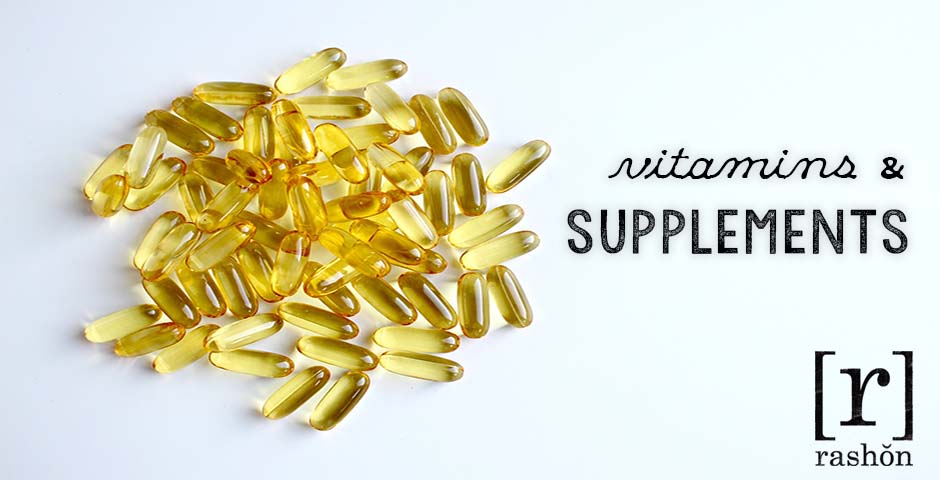As a nutritionist, I get asked A LOT about vitamins and supplements – do I recommend them, do I require them for my clients, which ones do I recommend, etc. I thought it best to just address these questions all in one place because I think many people can benefit from the answers. Here’s the deal: Vitamins and supplements can be really confusing, and the options are just about limitless. Hopefully the information shared here will help you wade through some of the madness, but know that working with a professional – whether that’s a nutritionist or your doctor – is typically a good idea.

First and foremost, I believe that your vitamins and nutrients should come from your food. When you’re eating foods in their whole form, you’re getting all the cofactors needed to process the various nutrients that you’re getting. Your body knows exactly what to do with them when you’re getting them from your food. That being said, given that most people are following a Standard American Diet that includes lots of processed foods, or lower quality foods, getting the nutrients you need through diet alone can be tough. Additionally, if you’re taking medications, those can often deplete your body of certain vitamins and minerals. And let’s face it, even when you’re eating all the right foods it can be tough to get everything your body needs. Certain health issues can be caused by a lack of specific nutrients, so supplementation is needed to heal. Sometimes supplements are a necessary thing.
With my own clients, we start with food first, and I recommend supplements only as needed based on health history, medications and lifestyle. I’m never looking to load you down with extra steps to worry about or products to buy. I’m only looking to help you find optimal health in a way that works for you!
Okay, back to the topic at hand. In general, I won’t give blanket supplement recommendations or dosing on my website or social media. (Note: There are a few exceptions to this, but they are few and far between.) There are too many factors to consider on an individual basis. I can give you some guidelines to follow, though, if supplements are being considered.
Quality Matters
The most important thing to know, or to take into consideration, is the quality of the supplements you’re taking. Lower quality supplements can have unnecessary extra fillers or dirty ingredients that you don’t want to be ingesting. Additionally, the quality of the vitamins and minerals themselves can be questionable, and this can effect how your body processes them. Choosing the highest quality supplement at a price point you can afford is of utmost importance.
Cofactors
Understanding how vitamins and minerals are absorbed and processed in the body matters, too. Listen, I’m not saying you should know all of this – that’s why working with a nutritionist or your doctor is important. For example, Vitamin D is something most people are deficient in; however, it’s fat soluble, which means it’s best when encapsulated with olive oil (or similar safe oil) for your body to absorb it, and use it properly. Oh, side note: did you know you need the D3 form if you’re supplementing?
Duration
Some supplements are safe to take long term, while others need to be taken for a short period of time or for alternating weeks, etc. A good quality multivitamin is most likely safe for long term use. In general, multivitamins have small amounts of the nutrients included in the supplement, and won’t affect your health negatively. That being said, certain vitamins and minerals when taken long term or in too high of a dosage, can cause other nutrients to be depleted or thrown out of balance. For example, zinc is an excellent immune booster; however, if taken daily for too long, it can cause copper levels in the body to drop, which then causes a whole different set of health issues.
These are just a few things to consider when you’re looking at taking supplements. I wouldn’t say this list is all  inclusive because there are a lot of factors involved when it comes to adding in vitamins and nutrients in pill/powder/capsule form.
inclusive because there are a lot of factors involved when it comes to adding in vitamins and nutrients in pill/powder/capsule form.
Just as a recap:
- Choose high-quality, whole foods-based supplements for both optimal results and safety. If you’re going to spend the money, then spend it on quality supplements that have a better chance of working for you.
- If you take medications or other supplements, you need to make sure that there aren’t any negative interactions with the new supplements.
- Consult a nutritionist or your physician before taking any supplement.
- Remember that everyone is different. Your nutritional needs are different than mine, and therefore what works for you might not work for me.
Here are some brands that I trust and would recommend to my clients. I’m linking directly to the brands here, but you can also find them on Amazon or in health food stores. These aren’t affiliate links – just brands I use/trust. It is not an exhaustive list either – there are plenty of other great brands out there. These are listed in no particular order.
- Jarrow Formulas
- Biotics
- Designs for Health
- Garden of Life
- Life Extension
- Nordic Naturals
- Pure Encapsulations
- Thorne Research
- Source Naturals
- Klaire Labs

The best source of the nutrients your body needs!
Keep in mind that your best source of nutrients is always real, whole foods – organic when possible – while avoiding processed foods and damaged fats. I think this is a pretty good primer on general supplement info. Remember that this is just basic information and there is a lot to consider when taking supplements – the most important being that it all varies from person to person.
One last thing I’d like to leave with you is to be wary of companies that over-promise big results with their products. If it sounds to good to be true, there’s a good chance that it is. I’m not naming names here, but if you have questions about a supplement, feel free to reach out to me. I won’t give individual advice if you’re not a client, but I will give you my honest opinion about specific brands. If you’d like more information specific to your needs, I’d love to work with you!
Tell me: What is your take on supplements? Are they part of your daily routine?
Disclaimer: The information provided on this website is for educational purposes only. It is not intended to treat or diagnose any health condition. Please consult a doctor, healthcare professional or a Nutrition Consultant for information specific to your health needs.





0 Comment